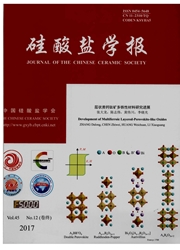

 中文摘要:
中文摘要:
采用熔融法制备出了无碱型RO-Al2O3-SiO2玻璃。研究了残余应力、钢化工艺以及样品尺寸对RO-Al2O3-SiO2玻璃的弹性模量、剪切摸量、维氏硬度、弯曲强度和断裂韧性等力学性能的影响。结果表明:合适的钢化工艺和残余应力可以显著提高其弯曲强度和断裂韧性,但对其它力学性能影响较小。经钢化处理后的RO-Al2O3-SiO2玻璃的弯曲强度和断裂韧性分别达到了263MPa和2.28MPa·m^1/2。与没有经钢化处理的玻璃样品相比,分别提高到了4倍和235%。提出了1种新型的钢化工艺——非对称钢化工艺,对于在非对称载荷下服役的玻璃构件来说,非对称钢化工艺有可能在提高玻璃力学性能的同时还可以降低其自爆风险。
 英文摘要:
英文摘要:
Alkali-free RO-Al2O3-SiO2 glass was prepared by the melting method. The effects of residual stress, tempering procedure and sample size on the mechanical properties of RO-Al2O3-SiO2 glass including the elastic modulus, shear modulus, Vickers hardness, flexural strength, and fracture toughness, were investigated. It is revealed that a suitable tempering procedure and residual stress greatly improves the flexural strength and fracture toughness, but has little effect on the other mechanical properties. The flexural strength and fracture toughness are enhanced up to 263 MPa and 2.28 MPa·m^1/2, which is about 4 times and 235% of those of original glass, respectively. The effects of symmetrical tempering process and asymmetrical tempering procedure on the mechanical properties were compared in this experiment. It is proven that the asymmetrical tempering procedure may be a good method to enhance the mechanical properties and decrease the failure risk for the case of asymmetrical loads.
 同期刊论文项目
同期刊论文项目
 同项目期刊论文
同项目期刊论文
 Fracture toughness determination of Ti3Si(Al)C2 and Al2O3 using a single gradient notched beam (SGNB
Fracture toughness determination of Ti3Si(Al)C2 and Al2O3 using a single gradient notched beam (SGNB Evaluation of hardness, local stregnth and contact fatigue of brittle hard coating at high temperatu
Evaluation of hardness, local stregnth and contact fatigue of brittle hard coating at high temperatu Evaluation of elastic modulus and strength of glass and brittle ceramic materials by compressing a n
Evaluation of elastic modulus and strength of glass and brittle ceramic materials by compressing a n 期刊信息
期刊信息
